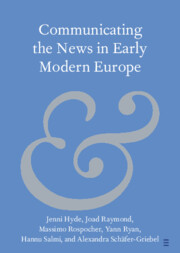Element contents
Communicating the News in Early Modern Europe
Published online by Cambridge University Press: 23 November 2023
Summary
- Type
- Element
- Information
- Online ISBN: 9781009384445Publisher: Cambridge University PressPrint publication: 14 December 2023

